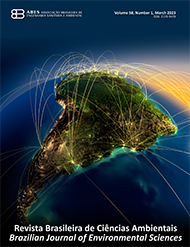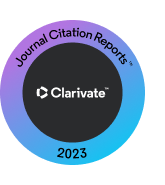The role of BRICS metropolises in the management of Waste Electrical and Electronic Equipment
DOI:
https://doi.org/10.5327/Z2176-94781836Palavras-chave:
protagonismo das metrópoles; gestão de resíduos de equipamentos elétricos e eletrônicos; políticas e ações; atores; BRICSResumo
O aumento populacional urbano projeta um incremento de mais de dois bilhões de habitantes nas cidades em três décadas, abarcando mais de dois terços do consumo e metade da geração de resíduos do planeta, sendo os Resíduos de Equipamentos Elétricos e Eletrônicos (REEE) o fluxo de maior crescimento. Calcula-se que em 2030 os volumes de REEE alcancem 24 Mt. Os países BRICS (Brasil, Rússia, Índia, China e África do Sul) serão responsáveis por uma parcela significativa desse consumo e desperdício em metrópoles de destaque global. O objetivo desta pesquisa é descrever políticas de gestão dos REEE em metrópoles BRICS, identificando seus atores, a fim de subsidiar a estruturação de políticas e ações para a gestão sustentável desses resíduos. A metodologia emprega a abordagem qualitativa nos estudos de casos: São Paulo, Moscou, Delhi, Pequim e Joanesburgo. Os resultados indicam a relevância do protagonismo das metrópoles na gestão sustentável e inclusiva dos REEE, articulando-se em sinergia com os atores na implantação de políticas e ações circulares relacionadas, alinhadas às legislações nacionais e adequadas a sua territorialidade.
Downloads
Referências
Abalansa, S.; El Mahrad, B.; Icely, J.; Newton, A., 2021. Electronic waste, an environmental problem exported to developing countries: the GOOD, the BAD and the UGLY. Sustainability, v. 13, (9), 5302. https://doi.org/10.3390/su13095302
Aim2Flourish, 2022. Pioneering Recycling of Electronic Waste in Russia - Tele 2 (Accessed December 10, 2022) at:. https://aim2flourish.com/innovations/pioneering-recycling-of-electronic-waste-in-russia.
Arya, S.; Kumar, S., 2020. E-waste in India at a glance: Current trends, regulations, challenges and management strategies. Journal of Cleaner Production, v. 271, 122707. https://doi.org/10.1016/j.jclepro.2020.122707
Awasthi, A.K.; Li, J., 2017. Management of electrical and electronic waste: A comparative evaluation of China and India. Renewable and Sustainable Energy Reviews, v. 76, 434-447. https://doi.org/10.1016/j.rser.2017.02.067
Baldé, C.P.; Forti, V.; Gray, V.; Kuehr, R.; Stegmann, P., 2017. The global e-waste monitor 2017: Quantities, flows and resources. United Nations University, International Telecommunication Union, and International Solid Waste Association (Accessed May 11, 2023) at:. https://ewastemonitor.info/wp-content/uploads/2020/11/Global-E-waste-Monitor-2017-electronic-spreads.pdf
Bardin, L., 2008. Análise de conteúdo. São Paulo, Editora 70.
Bizerra, M.G.; Santos, L.A.; Cordeiro, L.F.A.; Sales, A.T., 2023. Bibliometric review of electro-electronic waste (WEEE) in the Web of Science database: groups’ production and main themes. Revista Brasileira de Ciências Ambientais (RBCIAMB), v. 58, (3), 342-351. https://doi.org/10.5327/Z2176-94781634
Cheshmeh, Z.A.; Bigverdi, Z.; Eqbalpour, M.; Kowsari, E.; Ramakrishna, S.; Gheibi, M., 2023. A comprehensive review of used electrical and electronic equipment management with a focus on the circular economy-based policy-making. Journal of Cleaner Production, v. 389, 136132. https://doi.org/10.1016/j.jclepro.2023.136132
City of Johannesburg, 2020. City of Johannesburg’s 2018/2019 Integrated Annual Report. 2020 Association (Accessed February 19, 2022) https://www.joburg.org.za/documents_/Documents/Annual%20Reports/20182019%2 0Annual%20Report/2018- 19%20City%20of%20Johannesburg%20Annual%20Report%20.pdf.
City of Johannesburg, 2022. Information (Accessed August 30, 2022) at:. https://www.joburg.org.za/.
Cooperative Governance and Traditional Affairs, 2020. Municipal Profiles, Pretoria. South África. (Accessed June 20, 2022) at:. https://www.cogta.gov.za/ddm/index.php/documents/.
Coopermiti, 2021. Information (Accessed June 30, 2022) at:. https://coopermiti.com.br/.
Corwin, J.E., 2018. “Nothing is useless in nature”: Delhi’s repair economies and value-creation in an electronics “waste” sector. Environment and Planning A: Economy and Space, v. 50, (1), 14-30. https://doi.org/10.1177/0308518X177390
Dutta, D.; Goel, S., 2021. Understanding the gap between formal and informal e-waste recycling facilities in India. Waste Management, v. 125, 163-171. https://doi.org/10.1016/j.wasman.2021.02.045
Ecopolis Corporation, 2022. Information (Accessed August 30, 2022) at:. https://ecotechprom.green.
Exame, 2017. Pequim não poderá ter mais que 23 milhões de habitantes em 2020. (Accessed May 20, 2022) at:. https://exame.com/mundo/pequim-nao-poderater-mais-que-23-milhoes-de-habitantes-em-2020/.
Forti, V.; Baldé, C.P.; Kuehr, R.; Bel, G., 2020. The global e-waste monitor 2020. United Nations University (UNU), International Telecommunication Union (ITU) & International Solid Waste Association (ISWA), Bonn/Geneva/Rotterdam.
Galvão, T.F.; Pansani, T.D.S.A.; Harrad, D., 2015. Principais itens para relatar revisões sistemáticas e meta-análises: a recomendação PRISMA. Epidemiologia e Serviços de Saúde, v. 24, (2), 335-342. https://doi.org/10.5123/S1679-49742015000200017
Gollakota, A.R.; Gautam, S.; Shu, C.M., 2020. Inconsistencies of e-waste management in developing nations – facts and plausible solutions. Journal of Environmental Management, v. 261, 110234. https://doi.org/10.1016/j.jenvman.2020.110234
Government of National Capital Territory of Delhi, 2021. Delhi - Department of Environment, (Accessed August 10, 2022) at:. https://web.delhi.gov.in/wps/wcm/connect/Environment/environment/home.
Grant, R., 2019. E-waste challenges in Cape Town: Opportunity for the green economy? Urbaniizziv, v. 30, (Supp.), 5-23. https://doi.org/10.5379/urbani-izziv-en-2019-30-supplement-001
Gu, Y.; Wu, Y.; Xu, M.; Wang, H.; Zuo, T. ,2016. The stability and profitability of the informal WEEE collector in developing countries: A case study of China. Resources, Conservation and Recycling, v. 107, 18-26. https://dx.doi.org/10.1016/j.resconrec.2015.12.004.
Heidemann, T.; Bogdanov, D., 2020. Waste reform in Russia: administrative powers at federal, regional and local levels. CMS Law-Now. Russia (Accessed March 15, 2022) at: https://www.lexology.com/library/detail.aspx?g=c0f5d11d-c753-46f2-8180-7defb15069fe
Hindustan Times, 2021. In a year, Delhi to get eco park to manage e-waste (Accessed August 30, 2022) at:. https://www.hindustantimes.com/cities/delhi-news/in-a-year-delhi-toget-eco-park-to-manage-ewaste-101632329921917.html.
India Brand Equity Foundation, 2021. Data (Accessed May 15, 2022) at:. https://www.ibef.org/economy/indiasnapshot/facts-about-indian-economy
Instituto Brasileiro de Geografia e Estatística (IBGE), 2021. Data (Accessed August 10, 2022) at:. https://www.ibge.gov.br/indicadores.html?view=default/.
International Telecommunication Union, 2021 (Accessed September 30, 2022) at:. https://www.itu.int/en/Pages/default.aspx.
Kim, V.J.H.; De Vasconcelos Barros, R.T., 2021. Análise comparativa das gestões municipais de resíduos sólidos de São Paulo (Brasil) e Delhi (Índia). In Proceedings book - 4º Congresso Sul-Americano de Resíduos Sólidos e Sustentabilidade. Gramado. IBEAS - Instituto Brasileiro de Estudos Ambientais (Accessed September 22, 2023) at:. https://www.ibeas.org.br/conresol/conresol2021/IV-005.pdf.
Koshta, N.; Patra, S.; Singh, S.P., 2021. Estimation of E-waste at micro level for reverse logistics: a case of Delhi. Journal of Cleaner Production, v. 314, 128063. https://doi.org/10.1016/j.jclepro.2021.128063
Lacerda, R.T.O.; Ensslin, L.; Ensslin, S.R., 2012. Uma análise bibliométrica da literatura sobre estratégia e avaliação de desempenho. Gestão & Produção, v. 19, (1), 59-78. https://doi.org/10.1590/S0104-530X2012000100005
Lopes dos Santos, K., 2020. The recycling of e-waste in the Industrialised Global South: the case of Sao Paulo Macrometropolis. International Journal of Urban Sustainable Development, v. 13, (1), 56-69. https://doi.org/10.1080/19463138.2020.1790373
Monteiro, M.S., 2019. Panorama da logística reversa de resíduos de equipamentos eletroeletrônicos no Brasil. In: Proceedings book - 10º Fórum Internacional de Resíduos Sólidos (Accessed November 10, 2021) at:. https://www.institutoventuri.org.br/ojs/index.php/firs/issue/view/Anais-FIRS-2019.
Organization for Economic Co-Operation and Development (OECD), 2021. A territorial approach to the sustainable development goals in Moscow, Russian Federation. Centre for Entrepreneurship, SMEs, Regions and Cities of the OECD (Accessed May 20, 2022) at:. https://www.oecdilibrary.org/docserver/733c4178-en.pdf.
Oris Prom, 2022. Information (Accessed July 20, 2022) at:. https://orisprom.ru/.
Pandey, P.; Govind, M., 2014. Social repercussions of e-waste management in India: a study of three informal recycling sites in Delhi. International Journal of Environmental Studies, v. 71, (3), 241-260. https://doi.org/10.1080/00207233.2014.926160.
Parveen, S.; Yunfei, S.; Khan, J.; Haq, A.U.; Ruinan, S., 2019. E-waste Generation and Awareness on Managing Disposal Practices at Delhi National Capital Region in India. In: 2019 16th International Computer Conference on Wavelet Active Media Technology and Information Processing (pp. 109-113). IEEE.
Pedro, F.; Giglio, E.; Velazquez, L.; Munguia, N., 2021. Constructed governance as solution to conflicts in e-waste recycling networks. Sustainability, v. 13, (4), 1701. https://doi.org/10.3390/ su13041701
Petit-Boix, A.; Leipold, S., 2018. Circular economy in cities: Reviewing how environmental research aligns with local practices. Journal of Cleaner Production, v. 195, 1270-1281. https://doi.org/10.1016/j.jclepro.2018.05.281
Pikitup Johannesburg Soc Limited, 2022. Information (Accessed August 30, 2022) at:. https://www.pikitup.co.za/.
Rodrigues, A.C.; Boscov, M.E.G.; Günther, W.M.R., 2020. Domestic flow of e-waste in São Paulo, Brazil: characterization to support public policies. Waste Management, v. 102, 474-485. https://doi.org/10.1016/j.wasman.2019.10.052
Russian Environmental Operator, 2022. Information (Accessed August 30, 2022) at:. https://reo.ru.
Ruthes, S.; Silva, C.L., 2015. O uso de estudos prospectivos na análise de políticas públicas: uma análise bibliométrica. In: Proceedings book - Congresso Latino-Iberoamericano de Gestão da Tecnologia (pp. 1-19) (Accessed March 21, 2023) at:. https://repositorio.altecasociacion.org/bitstream/handle/20.500.13048/1347/228.770.pdf?sequence=1
Samson, M., 2021. Johannesburg is threatening to sideline informal waste pickers. Why it’s a bad idea. The Conversation Africa. University of the Witwatersrand (Accessed August 15, 2022) at:. https://theconversation.com/johannesburg-is-threatening-tosideline-informal-waste-pickers-why-its-a-bad-idea-159969.
São Paulo, 2014. Comitê Intersecretarial para a Política Municipal de Resíduos Sólidos. Plano de Gestão Integrada de Resíduos Sólidos 2014. Prefeitura do Município de São Paulo, São Paulo (Accessed August 30, 2022) at:. https://www.prefeitura.sp.gov.br/cidade/secretarias/upload/servicos/arquivos/PGIRS2014.pdf.
São Paulo, 2020a. Lei nº 17.471, de 30 de setembro de 2020. Estabelece a obrigatoriedade da implantação de logística reversa no Município de São Paulo para recolhimento dos produtos que especifica e dá outras providências (Accessed August 30, 2022) at:. https://legislacao.prefeitura.sp.gov.br/leis/lei-17471-de-30-de-setembro-de-2020.
São Paulo, 2020b. Secretária Executiva do Comitê de Mudança do Clima e Ecoeconomia de São Paulo. Plano de Ação Climática do Município de São Paulo 2020-2050. Prefeitura do Município de São Paulo, São Paulo (Accessed July 30, 2021) at:. https://www.prefeitura.sp.gov.br/cidade/secretarias/upload/meio_ambiente/arquivos/ PlanClimaSP_BaixaResolucao.pdf.
São Paulo, 2020c. Secretaria de Infraestrutura e Meio Ambiente. Plano de resíduos sólidos do estado de São Paulo 2020. Secretaria de Infraestrutura e Meio Ambiente, São Paulo (Accessed July 27, 2021) at:. https://www.infraestruturameioambiente.sp.gov.br.
Sko Electronics – Recycling, 2022. Information (Accessed October 30, 2022) at:. https://e-epr.ru.
Steuer, B.; Ramusch, R.; Salhofer, S., 2018. Is there a future for the informal recycling sector in urban China? Detritus,v. 4, 189-200. https://doi.org/10.31025/2611-4135/2018.13725
The Hindu, 2021. Delhi L-G reviews progress of e-waste park (Accessed October 30, 2021) at:. https://www.thehindu.com/news/cities/Delhi/delhi-l-g-reviews-progress-of-e-waste-park/article36620987.ece
The People’s Government of Beijing Municipality, 2021. (Accessed May 15, 2022) at:. https://english.beijing.gov.cn.
The Times of India, 2021. Delhi: Dispose of e-waste properly, departments told (Accessed October 7, 2022) at:. https://timesofindia.indiatimes.com/city/delhi/dispose-of-ewaste-properly-depts-told/articleshow/84956085.cms.
Toxics Link, 2019. Informal e-waste recycling in Delhi: Unfolding Impact of two years of E-Waste (Management) Rules 2016 (Accessed November 15, 2022) at:. https://www.toxicslink.org/docs/Informal%20E-waste.pdf.
UN-Habitat, 2022. World Cities Report 2022. Envisaging the Future of Cities. United Nations Human Settlements Programme (UN-Habitat) (Accessed October 25, 2022) at:. https://unhabitat.org/sites/default/files/2022/06/wcr_2022.pdf.
United Centre for International Industrial Cooperation in The Russian Federation, 2022. E-waste Academy (Accessed September 25, 2022) at:. https://www.unido.ru/eng/.
United Nations, 2020. Base data (Accessed September 15, 2022) at:. https://www.un.org/.
United Nations, 2018. World Urbanization Prospects: The 2018 Revision. Department of Economic and Social Affairs, Population Division (Accessed October 5, 2022) at:. https://population.un.org/wup/DataQuery/.
Vieira, B.D.O.; Guarnieri, P.; Camara e Silva, L.; Alfinito, S., 2020. Prioritizing barriers to be solved to the implementation of reverse logistics of e-waste in Brazil under a multicriteria decision aid approach. Sustainability, 12, (10), 4337. https://doi.org/10.3390/su12104337
Wang, J.; Mishima, N., 2019. Province-level estimation of waste mobile phones in China and location planning of recycling centers. Waste Management & Research, v. 37, (9), 898-905. https://doi.org/10.1177/0734242X19861668.
Williams, J., 2019. Circular cities. Urban Studies, v. 56, (13), 2746-2762 (Accessed July 22, 2023) at:. https://discovery.ucl.ac.uk/id/eprint/10067084/1/Williams_paper3%20urban%20studies.pdf.
World Bank, 2019. Modest growth; focus on informality. Russia Economic Report 41 (Accessed November 08, 2023) at:. https://openknowledge.worldbank.org/bitstream/handle/10986/31933/RussiaEconomic-Report-Modest-Growth-Focus-onInformality.pdf?sequence=1&isAllowed=y.
World Bank Data, 2022. World Bank Open Data Portal (Accessed October 15, 2022) at:. https://data.worldbank.org/.
Xavier, L.H.D.S.M.; Ottoni, M.D.S.O., 2019. Economia circular e mineração urbana: resíduos de equipamentos eletroeletrônicos (Accessed December 12, 2022) at:. https://mineralis.cetem.gov.br/bitstream/cetem/2288/1/E-book_EC%26MU_Vers%C3%A3oFinal.pdf.
Yin, R.K., 2015. Estudo de caso-: planejamento e métodos. Bookman Editora, Porto Alegre.
Downloads
Publicado
Como Citar
Edição
Seção
Licença
Copyright (c) 2024 Revista Brasileira de Ciências Ambientais (RBCIAMB)

Este trabalho está licenciado sob uma licença Creative Commons Attribution 4.0 International License.

























